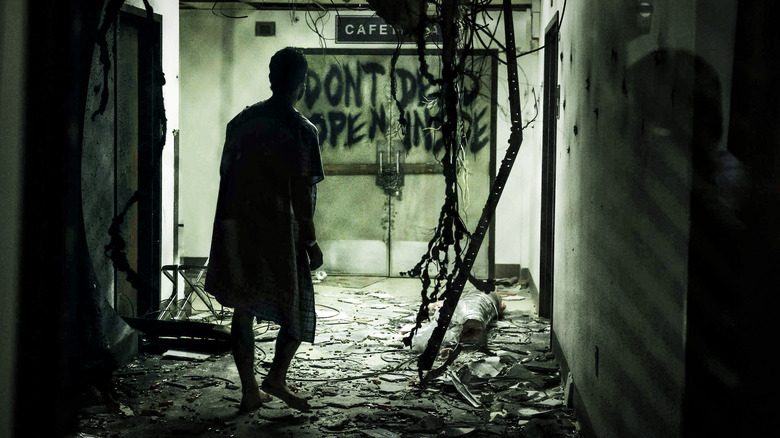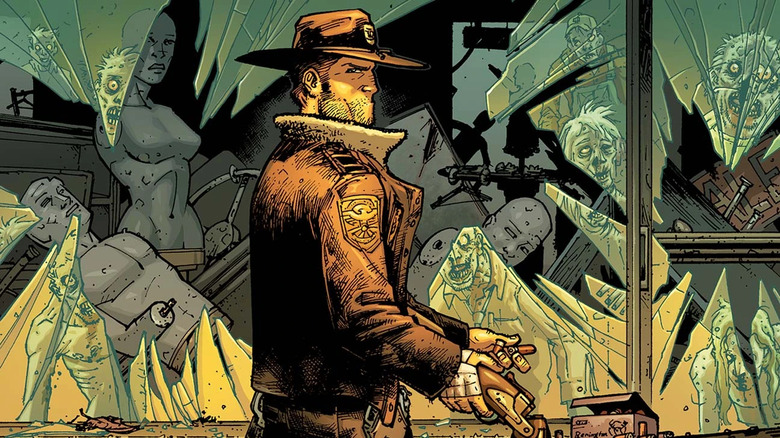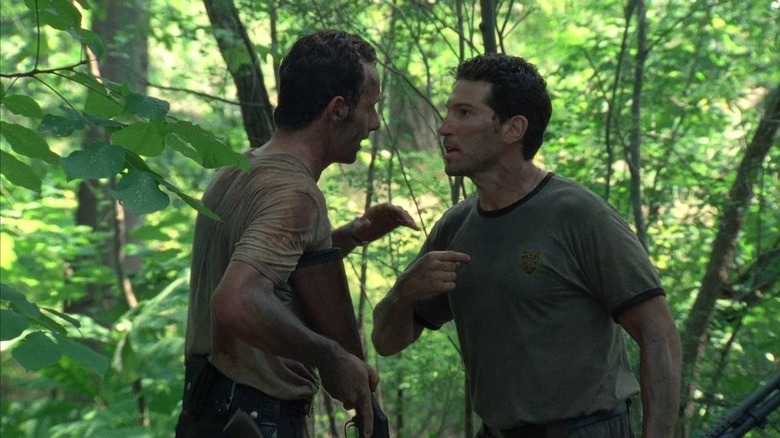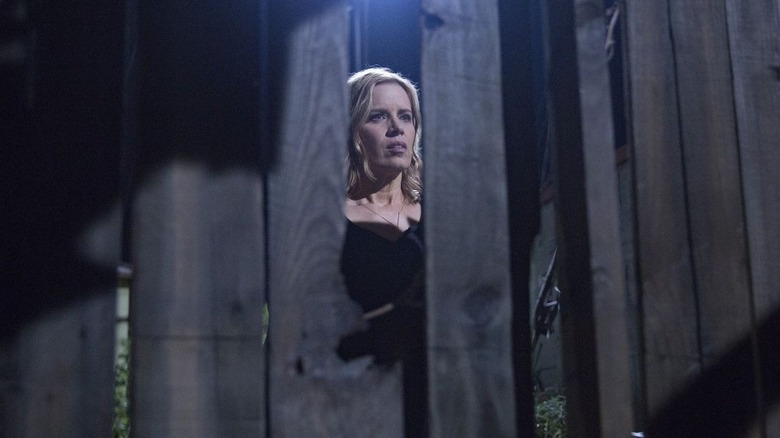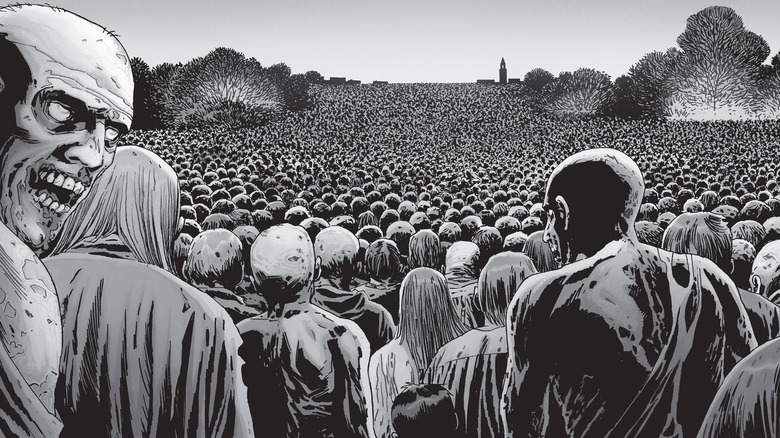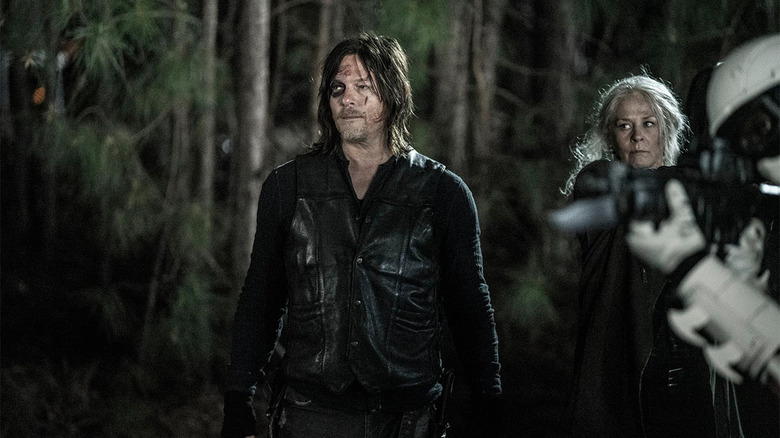Where Did The Walking Dead Go Wrong?
"The Walking Dead" may be officially ending with its series finale tonight, but it lived up to its title long before that. Once one of the most talked-about shows on TV, the series became a shell of its former self, shambling along like a zombie even as it bled viewers and left critics increasingly underwhelmed. For the record, season 5 was when I jumped ship and the season 6 finale killed any chance of the show winning me back.
It may not have been in the same storytelling league as AMC's crown jewels like "Breaking Bad" or "Mad Men," but "The Walking Dead" was a ratings juggernaut. From 2010 to 2017, viewership for "The Walking Dead" kept climbing. Then during season 7, the trend reversed. The season's premiere, "The Day Will Come When You Won't Be," brought in 17.03 million viewers. The next episode, "The Well," dropped nearly 5 million to 12.46. Compare the show's ratings peak, the season 5 premiere "No Sanctuary." That earned 17.29 million and then only lost about 2 million in the next episode, "Strangers." After the season 8 premiere, "Mercy," the show never drew more than 10 million viewers again.
How is one of the television giants of the early 2010s set to end with such a whimper? That's a long story, so strap in.
Background
The story of "The Walking Dead" doesn't begin on television. It was first told in the pages of comic books, written by Robert Kirkman, drawn in ghostly black and white by Tony Moore (and then Charlie Adlard), and published by Image Comics beginning in 2003. The comic was a hit, and an adaptation was inevitable. Frank Darabont, director of "The Shawshank Redemption," took interest, even pitching the series to NBC at one point.
Darabont's involvement brings us to the other "source material" for "The Walking Dead" — his film "The Mist." Released in 2007 and adapted from the book by Stephen King, it tells the story of people who are trapped in a supermarket when monsters invade. The film now feels like Darabont's beta test for "The Walking Dead," in the way that it centers a family's story during an apocalypse, and paints human faults as the real danger. Indeed, Darabont brought several cast members from "The Mist" with him to "The Walking Dead" — Melissa McBride (Carol), Laurie Holden (Andrea), Jeffrey DeMunn (Dale), and Sam Witwer (the "Tank Zombie").
AMC ordered "The Walking Dead" pilot at the start of 2010, and the first season premiered on Halloween later that year. Achieving critical and commercial success, the show should have sailed smoothly from there. But that wasn't meant to be.
Trouble begins
"The Walking Dead" season 1 is the show's best — and shortest. With only 6 episodes, it was tightly paced with not a moment wasted. It is also the only season of the show entirely overseen by Darabont, who was fired as showrunner in 2011. As /Film reported at the time, the given reason was creative and financial differences: AMC wanted Darabont to make a 13-episode second season for less money than the first six episodes. It also came to light years later that Darabont let the stress of running the show get to him; emails he sent during this period include abuse and outright threats to his crew and the show's writers.
Though Darabont's behavior warranted his removal, it left the show without a vision. Darabont, for instance, wanted a season 2 premiere showing how Atlanta was overrun by Zombies. The episode would've been framed through the eyes of Sam Witwer's character and was described as "'Black Hawk Down' with zombies." The main characters' visit to the CDC in the season 1 finale, "TS-19," hint that Darabont wanted to explore the origins of the zombie plague, which Kirkman has always been uninterested in.
Darabont was replaced with Glen Mazzara, an experienced TV producer and veteran of "The Shield." However, Mazzara oversaw a plodding second and then third season, the latter of which mangled fan-favorite comic elements like Andrea's character and the prison/Woodbury story arcs. Mazzara departed as showrunner after season 3 and was replaced by Scott Gimple, who'd written for the series since season 2. Gimple's tenure, from seasons 4 to 8, hewed closer to the source material but still suffered pacing problems. Notably, season 4 was the first season to have lower viewership for the finale than the premiere; the slow pacing of the season's back half likely lost some viewers.
A horde of spin-offs
"The Walking Dead" may not be about superheroes, but comic books are still the current Hollywood cash cow, and AMC didn't want the setting contained to just one show.
Beginning with season 2, AMC launched "Talking Dead," a talk show where Chris Hardwick would sit down with cast, crew, and/or celebrity "Walking Dead" fans to discuss that night's episode. The program's first guests were Patton Oswalt and James Gunn, with later appearances by fans — from Kevin Smith to Hayley Williams. Then in 2014, the network launched a proper spin-off: "Fear The Walking Dead." That series never had ratings to rival its parent show, but it's still running with an eighth season on the way.
Gimple stepped down as showrunner for "The Walking Dead" after season 8. Unlike Darabont, this wasn't due to disagreements with AMC — quite the opposite. He was promoted to "chief content officer" while Angela Kang took over show-running the main series.
Kang's tenure saw an improvement in reviews, but not ratings. Rick also exited the show in season 9 episode 5, "What Comes After," but the show held off on killing him. Why? So Andrew Lincoln could headline a trilogy of spin-off movies (later turned into a TV series).
Two more "Walking Dead" spin-offs, both the brain-children of Gimple, have since aired. "The World Beyond" ran two seasons from 2020 and 2021, focusing on Nebraskan teenagers who came of age in a world of the dead. "Tales of the Walking Dead," which debuted in August 2022, is an anthology spotlighting new characters from across the setting.
More spin-offs are on the way: the aforementioned Rick Grimes series, a Daryl Dixon (Norman Reedus) series (originally set to co-star Melissa McBride as Carol), and "Dead City," focusing on Negan (Jeffrey Dean Morgan) and Maggie (Lauren Cohan).
Oversaturation
Can all of these "Walking Dead" spin-offs sustain themselves when interest in their originator has declined so much? My bet is no. It's Econ 101: if you overload the market, you'll decrease your product's value.
Compare HBO and the handling of its own blockbuster series, "Game of Thrones." After the poor reception of its eighth season, HBO kept Westeros off TV screens for a few years and even passed on a subpar pilot that cost $30-35 million to shoot. This restraint paid off, and HBO now has another hit on its hands with "House of the Dragon." AMC could learn from this sort of patience.
On the other hand, consider the cop show franchises that dominate network TV: "Law and Order," "NCIS," "CSI," etc. Those shows have given birth to many successful spin-offs. Why can't "The Walking Dead" replicate this model? Well, these series are designed to be episodic and low committal. The whole pitch of "The Walking Dead," on the other hand, is that it's a zombie movie which doesn't end. You're invited to follow the characters from point A to point B, not just watch along as they do the same thing week after week.
You could alternate between, say, "Law and Order" and "Law and Order: SUV" every week and still enjoy yourself. With serialized stories like "The Walking Dead" and its spin-offs, you have to pick and choose where to invest your time and emotional involvement. When there's a surplus of series, that becomes harder to do, so you might as well just stick with the original.
Here's the other problem: "The Walking Dead" has no real hook beyond the fact its story continues.
Same old, same old
Notice how most of these forthcoming "Walking Dead" spin-offs simply continue the stories of established characters. They might as well just be more seasons of "The Walking Dead" itself. Not enough time has passed, either, so fans aren't longing to check in on the characters like old friends they haven't seen in a while.
"Fear The Walking Dead" initially tried to do something new. It was set in Los Angeles, quite a different sight from rural Georgia. While "The Walking Dead" skipped over the early days of the apocalypse outside of flashbacks, "Fear" began in the early days of the virus outbreak. It offered fans a chance to see the world's collapse firsthand. But it couldn't focus on that forever. It eventually became just a repainted version of its parent show, which was solidified when Morgan (Lennie James) jumped ship from the main series.
Why do you stay with a story? Because you like the characters. "The Walking Dead" relied on paranoia that any character could be next to die, but in the long-term, that becomes numbing and gives you less reason to care. The show spending a season and a half developing Beth (Emily Kinney) only to abruptly kill her off in "Coda" was especially exasperating. By being so kill-happy, the creative team of "The Walking Dead" helped kill their golden goose.
Then again, perhaps the decline of "The Walking Dead" was inevitable. The show drew people in by persisting long past the point that a zombie movie would have killed everyone off, and that led to some great and unique storytelling. But whether the end comes as a purposeful conclusion or a slow death by declining ratings, no TV show can last forever.
